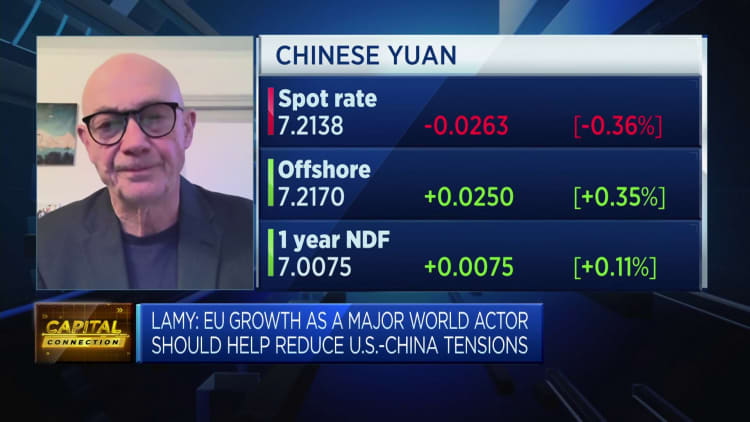
German Economy Minister Habeck and U.S. Secretary of State Antony Blinken held a bilateral meeting at a hotel on Gendarmenmarkt, with American and German flags on the table. Photo: Christoph Soeder/dpa (Photo: Christoph Soeder/Photo Alliance via Getty Images)
Christoph Söder/dpa | Photo Alliance | Getty Images
China has been Germany’s main trading partner for many years, but over time the United States seems to have quietly taken over the top spot.
Total exports and imports From January to March 2024, trade volume between Germany and the United States totaled 63 billion euros ($68 billion). Reuters first reported the change on Thursday.
Carsten Brzeski, global head of macro research at ING Research, told CNBC that several factors played a role in the change.
“This shift is the result of a number of factors: Strong growth in the United States has boosted demand for German products. (…) At the same time, decoupling from China, weak domestic demand in China and China’s ability to produce goods that it previously imported from Germany (mainly cars) reduces German exports to China,” he said.
China has been Germany’s largest trading partner for many years, but the gap between China and the United States has been shrinking in recent years. Holger Schmieding, chief economist at Berenberg Bank, told CNBC that the United States has long been a larger market for German exports than China.
He noted that while the U.S. share of German exports has been growing in recent years, China’s share has been declining. “China’s economy is faltering and German companies are facing tougher competition from Chinese companies that receive subsidies,” Schmieding said.
The key difference, he noted, is that now the United States is also becoming more important in terms of imports.

Germany has been promoting a new China strategy, last year urging companies to “reduce” China risks. The German government emphasizes that China will remain Germany’s partner and “decoupling” should not occur, but “systemic competition” has increasingly become a feature of the relationship between the two countries.
Tensions have also increased between the European Union and China, with the two countries launching investigations into each other’s trade practices and threatening to impose tariffs on imported products.
Last month, a survey by Ifo, a German economic research institute, found that the number of companies claiming to be in distress Dependent on China This proportion dropped from 46% in February 2022 to 37% in February 2024, the report said.
“The fact that the United States has become Germany’s largest trading partner really speaks to changing trade patterns and the gradual decoupling from China,” Brzeski said.







